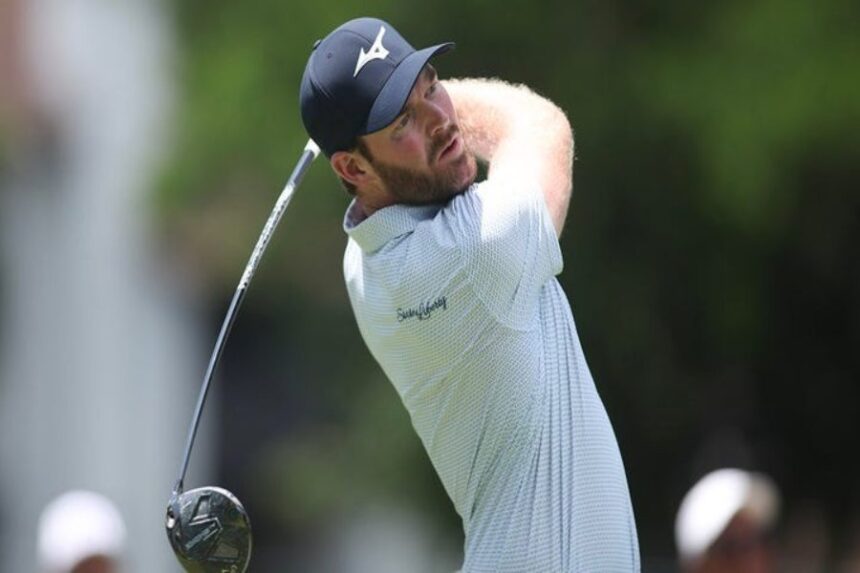The golfing world is reeling from the unexpected and tragic news of PGA Tour player Grayson Murray’s death at the age of 30. Murray, who had recently withdrawn from the Charles Schwab Challenge due to an illness, passed away on Saturday morning. The talented golfer had played 16 holes in the second round of the tournament before deciding to step away, leaving fans and fellow players in shock.
Murray’s early departure from the tournament followed a promising start, with a two-under 68 on Thursday. However, his performance on the second day was marred by a series of bogeys on his final three holes. Despite these challenges, the news of his sudden death has left the sports community grappling with a profound sense of loss.
PGA Tour Commissioner Jay Monahan expressed deep sorrow in an official statement. “We are devastated to learn and heartbroken to share that PGA Tour player Grayson Murray passed away this morning. I am at a loss for words,” Monahan said. “The PGA Tour is a family, and losing a member of our family leaves an indelible mark. We mourn Grayson and extend our prayers for comfort to his loved ones.”
Monahan also reached out personally to Murray’s parents, offering his condolences and the support of the entire PGA Tour community. He shared that Murray’s parents had requested the continuation of the tournament, emphasizing that their son would have wanted it that way. “As difficult as it will be, we want to respect their wishes,” Monahan added.
Grayson Murray’s journey in professional golf was marked by both triumphs and personal struggles. Ranked 58th in the world, he had secured two career wins on the PGA Tour. His recent victory at this year’s Sony Open in Hawaii was a highlight of his career, where he won in a playoff against Keegan Bradley and An Byeong-hun. His first win came at the 2017 Barbasol Championship, showcasing his potential as a rising star in the sport.
Murray’s talent on the course was evident from an early age. Born on October 1, 1993, in Raleigh, North Carolina, he showed a natural aptitude for golf. He played college golf at Wake Forest University and Arizona State University before turning professional in 2015. His journey through the ranks of professional golf was characterized by determination and a relentless pursuit of excellence.
Despite his success on the golf course, Murray faced significant personal challenges. He was open about his battles with depression and anxiety, shedding light on the mental health struggles that many athletes face. Murray also sought treatment for alcohol abuse, a journey that he candidly shared with his fans and the public. In January, he proudly announced that he had been sober for several months, marking a significant milestone in his recovery.
Murray’s honesty about his struggles endeared him to many, as he used his platform to raise awareness about mental health issues. His journey was a testament to his resilience and courage, inspiring others to seek help and support when needed. His untimely death has left a void in the golfing community, highlighting the importance of mental health support for athletes.
The news of Murray’s passing has elicited an outpouring of grief and tributes from the golfing community. Fellow players, coaches, and fans have taken to social media to share their condolences and memories of the talented golfer. Many have expressed their shock and sadness, reflecting on Murray’s impact on their lives both on and off the course.
“Grayson was not only a great golfer but also a great friend,” said fellow PGA Tour player Justin Thomas. “His honesty and openness about his struggles were fearless, and he inspired many of us. My thoughts and prayers are with his family during this difficult time.”
Other players echoed similar sentiments, emphasizing Murray’s positive influence and the camaraderie he fostered within the golfing community. His willingness to speak out about his mental health challenges has been lauded as a significant contribution to the ongoing conversation about athlete well-being.
Grayson Murray’s legacy extends beyond his achievements on the golf course. He will be remembered for his resilience, courage, and the positive impact he had on those around him. His story serves as a poignant reminder of the importance of mental health and the need for continued support for athletes facing similar struggles.
Murray’s performances in major championships this year were a testament to his skill and determination. He made the cut in both major championships, finishing T43 in last week’s PGA Championship. Earlier this month, he secured a T10 finish at the Wells Fargo Championship, further solidifying his reputation as a formidable competitor on the tour.
In the wake of this tragedy, the PGA Tour has made grief counselors available to players and staff, underscoring the tight-knit nature of the golfing community. The support provided aims to help those affected by Murray’s passing navigate their grief and find comfort during this challenging time.
The continuation of the Charles Schwab Challenge, in accordance with the wishes of Murray’s parents, serves as a tribute to his love for the game and his competitive spirit. As players continue to compete, they do so with heavy hearts, honoring Murray’s memory with every swing.
Grayson Murray’s story highlights the ongoing need for mental health awareness and support within the sports community. His openness about his struggles has already made a significant impact, and it is crucial that his legacy continues to inspire change. Athletes at all levels should have access to the resources and support they need to address their mental health challenges and thrive both on and off the field.
As the golfing world mourns the loss of a talented player and a courageous individual, it is also a time to reflect on the broader issues that affect athletes’ well-being. By continuing to raise awareness and advocate for mental health support, we can honor Grayson Murray’s memory and ensure that his legacy lives on.
Grayson Murray’s untimely death at the age of 30 has left a profound impact on the golfing community and beyond. His journey, marked by both professional triumphs and personal struggles, serves as a powerful reminder of the importance of mental health awareness and support. As the PGA Tour and the broader sports community come together to mourn his loss, they also celebrate his life, his achievements, and the positive influence he had on so many.
In the days and weeks to come, the focus will be on honoring Grayson Murray’s memory, supporting his family and friends, and continuing the conversation about mental health in sports. His legacy will undoubtedly endure, inspiring future generations to seek help, support one another, and approach life’s challenges with the same resilience and courage that defined his remarkable journey.




